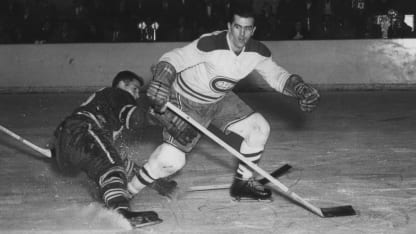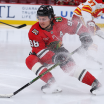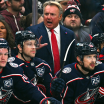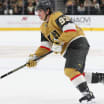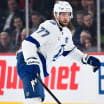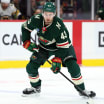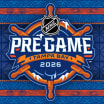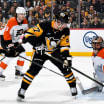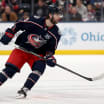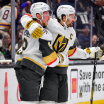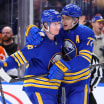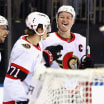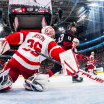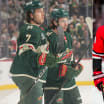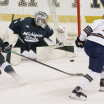Legendary hockey reporter Stan Fischler writes a weekly scrapbook for NHL.com. Fischler, known as "The Hockey Maven," shares his humor and insight with readers each Wednesday.
This week, Stan presents his popular "Voices from The Past" on the 69th anniversary of "The Richard Riot" in Montreal with a one-on-one interview with Maurice "Rocket" Richard from his book, "The Flying Frenchmen: Hockey's Greatest Dynasty," co-authored with the Hockey Hall of Famer. Richard details the roots of the conflict and opines about his controversial suspension in the spring of 1955.
How did the trouble start?
"In March 1955, I was leading the League in scoring for the first time in my life and desperately wanted to win the prize. In addition, we were leading the (Detroit) Red Wings in the battle for first place. With only a week left in the season, the chances of me winning the scoring title and our team finishing on top were very good. But we had a tough Saturday night at home and now we had a Sunday game in Boston, where I always seemed to have trouble over the years. This night was no different and the Bruins were laying on the lumber at every opportunity."
Who in particular was after you and what happened?
"Hal Laycoe was a defenseman who was a teammate of mine for a couple of seasons and now was with Boston. He hit me a bad check and I was trying to get even with him in the middle of the ice. I hit him and he fell and while falling he hit me in the eye with his stick, opening a bleeding wound over my eye -- and he wasn't even cut. I was good and mad and went after him, but (linesperson) Cliff Thompson, who once had played for the Bruins, jumped on my back, trying to stop me. It was the first time an official ever did that to me and I tried to shake him off."
Did you succeed?
"I pushed him off twice but while I was doing it, Laycoe took a good swing at me. Thompson kept returning and when Cliff jumped me for the third time we were backing up near the boards. After getting him off my back again I turned around and took a good swing at him. I felt he deserved it because I had already warned him twice to stop jumping on me. 'Stop me from the front if you want,' I told him, 'But not from behind.' But he wouldn't listen and that's why I hit him. Of course, I was thrown out of the game."
Were you surprised?
"The incident caused a much bigger uproar than I thought it would, especially since I didn't think I had started it. There was Laycoe who cut me and there was that 'homer' linesman, Thompson, who continued to provoke me by jumping me from the rear. But the League president (Clarence Campbell) ordered a hearing in his office two days later and I showed up with my coach Dick Irvin and Kenny Reardon from the front office. Laycoe was there as well as his coach Lynn Patrick."
What was the hearing like?
"It would be foolish for me to go on record that I wasn't at fault. There's no doubt that I hit Laycoe and had also hit Thompson. The point is that there was a great deal of provocation in both instances. I think my penalty (suspension for the remainder of the season and the entire Stanley Cup Playoffs) wouldn't have been so severe if Lynn Patrick had told the absolute truth to Campbell at the hearing. To this day I can't forgive him."
Explain what you mean?
"Patrick said that I started the fracas and had hit Laycoe first. Everything Patrick said to Campbell was completely different from the way I remembered it or the way the referee, Frank Udvari, recalled. Overall, Laycoe wasn't a bad guy, but his testimony left much to be desired."
What kind of punishment did you expect?
"I probably deserved to be suspended for the final three games of the season or possibly 10 or 15 games in the following season but not for the playoffs. I could see no justification for Campbell punishing my teammates or me by docking me from the Stanley Cup round. I still say that if justice was truly done, I wouldn't have been kept out of any of the Stanley Cup games."
How did you react to the news of your suspension?
"I've never been so shocked in my life. I felt numb from head to toe. All I wanted to do was get out of The Forum and go home. By the time I arrived home the news had spread all over the city. As soon as I walked into the house, I knew there would be big trouble. One after another people phoned me. 'Rocket,' they would say, 'we're going to get even with Campbell. There's going to be a lot of trouble (before the game with Detroit) at The Forum tonight.'"
What did you decide to do, and why?
"I sensed from my conversations that the people weren't about to be calmed. But I wasn't exactly sure what I should do -- stay home and brood about the suspension, or go to the game and root for my teammates? In the end I made up my mind that I'd be doing the boys, and myself, the most good if I went to The Forum."
What was the scene like at the Forum?
"People were marching around the building with placards denouncing Campbell. They were shouting and their mood was very ugly. When I got to my seat near the ice, the game had already started and the Canadiens couldn't seem to get untracked, Then Campbell made his grand entrance. I looked up and I could see some fans beginning to menace him. On one hand I felt pleased because I hated him for what he had done to me and on the other hand I didn't want to see harm come to him. Then a tear-gas bomb went off and the arena was getting filled with smoke."
How did you escape?
"The first thing I thought about was the safety of my wife who was in the stands. We had an emergency plan to meet at The Forum Clinic and when I got there, I saw that (wife) Lucille had beat me to it. But Campbell was there too along with the police chief. He told me, 'Rocket, don't even talk to him. Everybody is on your side. Just stay until the place clears out.' I never did get to Campbell. My wife and I stayed until the whole place emptied before we left."
(The game was cancelled and forfeited to the Red Wings. As Richard had feared, a riot erupted around The Forum and along the downtown shopping center. Teammate Bernie Geoffrion wound up winning the scoring title and Detroit beat out Montreal for first place. The Red Wings and Canadiens made it to the Stanely Cup Final, won by Detroit in seven games.)
